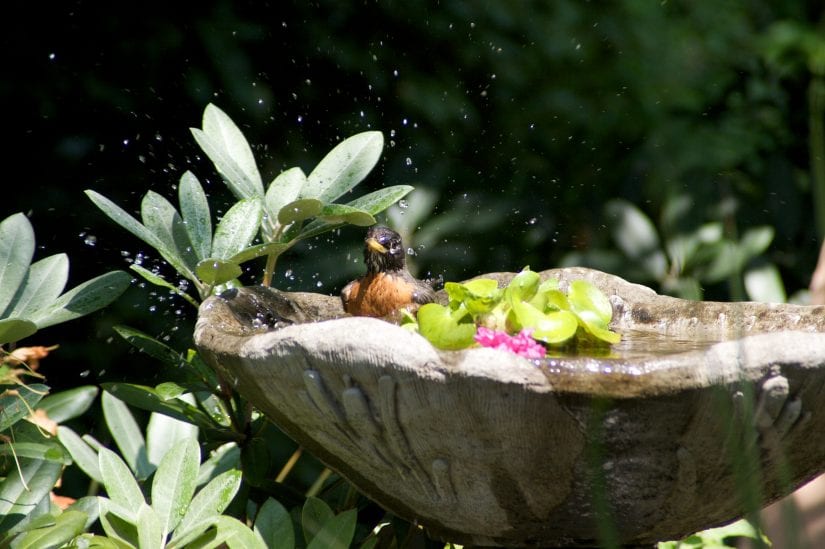When temperatures soar in the midst of wildfires, our local B.C. wildlife can struggle to cope. Like us, animals need to stay hydrated and be able to find shelter so they can get out of the scorching sun and avoid heat stress.
You can help, starting in your own backyard.
Use a bird bath
Extreme heat can cause natural water sources to dry up. Bird baths and ponds are a great way to provide fresh water for wildlife (not to mention they make for a refreshing dip!). However, bird baths can also be a source of disease transmission, so it’s important to not only refill bird baths daily, but also clean them thoroughly two or three times a week.
Don’t have a bird bath? No problem. You can also put out shallow dishes of water with rocks in the bottom for small animals and insects to perch on.

Birds aren’t the only wild animals that need water, especially in a heat wave. You can help provide hydration for wildlife by leaving small, shallow dishes with fresh water around your property. Make sure the dishes are shallow enough so that small species won’t drown. Place sticks or small stones in each dish so that small species, like insects, have a safe spot to perch and drink.
Place water dishes within view so that you remember to clean and refill them regularly. It’s also a great way to appreciate the wildlife that stops for a sip!
Provide some natural shelter
Wild animals need natural shelter, like trees and shrubs, to provide shade and shelter from the heat. Some ideas for natural shelter include:
- If your outdoor space allows, consider letting a section of your yard grow naturally. This will encourage native flowers and grasses to blossom – the local wildlife will see your garden as an extension of their existing habitat and will be more likely to visit.
- Consider planting native trees. For example, planting evergreens provides effective cover in the cold winter months, while deciduous trees help block the sun but allow for more air circulation.
- Brush piles made from logs, branches, flower stalks, leaves and twigs can give dense cover to small mammals, birds, reptiles and amphibians. As the piles slowly decay, they attract more insects, providing additional food for birds.
- Rock piles, especially when positioned near water and on sunny south-facing slopes, can provide great habitat for frogs and snakes.
- Piles of leaf litter can provide a place for insects, birds, and amphibians to find food, hide, nest and overwinter in. They also serve as a natural mulch to fertilize the soil.
- If you have bird feeders out, make sure they’re in a shady spot (and cleaned regularly!).
Keep your garden thriving
Light natural mulch, such as fallen leaves or finely shredded undyed wood shavings, can provide shelter and foraging spaces for animals. Adding mulch around the base of plants helps keep them moist and creates a place for wildlife to cool off. Even tall grass or an unmowed lawn can provide a sheltered spot for wildlife.
Plant native flowers, trees, bushes, and other plants for your garden with animals in mind. You can attract animals with plants that have seeds, berries or nectar for them to eat. Gardens with a variety of plants also attract insects — and the animals who feed on them.

Be a safe space
Wild animals see humans as predators, and this natural fear keeps them out of trouble. The best way to make them feel safe is by keeping your distance and keeping quiet. Watching wild animals from the window can be a joy. Don’t rush outside to photograph animals – sudden noise and movement could scare away an animal and make them less likely to return. Be patient with wild animals taking a rest stop in your yard. Save the yardwork for another day!
Don’t feed the wildlife
Even in times of scarcity, wild animals can and do find their own food sources. Feeding wildlife causes dependency and habituation which gets them into trouble. Wild animals suffer when they get used to eating human food instead of their natural diet. When people feed wildlife, the animals also lose their healthy fear of people. This increases their chances of being injured or killed.

